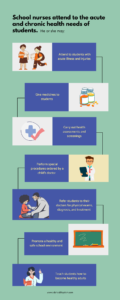Role of School Nurse in Managing Chronic Health Conditions in Students
There is no denying that a school nurse plays a vital role in schools by improving student health and supporting better health standards in schools. They are invaluable when it comes to managing and caring for students who have chronic health conditions.
Students with chronic diseases may have complex and sensitive healthcare needs. The school nurse is usually the only healthcare practitioner in a school for both emergencies and the everyday treatment of chronic health conditions.
Continue reading to learn how school nurses help students with chronic health issues.
The importance of school nurses in schools
Health services in American schools are accepted as an important element to meet the health care needs of students and faculty. According to the current guidelines from the national American associations of school nurses and pediatricians, every school district must appoint one school nurse for each school facility.
Students with chronic health conditions may have complex and ongoing healthcare needs. School nurses are the only health professionals in the schools for both normal and emergency management of chronic health disorders.
What challenges do students with chronic health issues face?
Children with chronic illnesses, also known as kids with special healthcare needs, are at risk of developing chronic illnesses that affect their physical, developmental, behavioral, or emotional well-being. They also require more and higher-quality health and related services than the other children.
Diabetes, cystic fibrosis, asthma, severe allergies, seizures, sickle cell disease, and spina bifida are among the ailments that students with chronic health conditions may experience.
Chronic illnesses will negatively impact the student’s behavioral and emotional health and increase anxieties in them. It is seen in children who have frequent hospitalizations or in kids who have little or no social support within their families.
EduHealth can help you here
The school nurse roles for students with chronic needs
School nurses play an important role in supporting children with chronic health concerns in schools and staying healthy and ready to study. They also work with parents and families to provide good care for children while they are in school.
Here are some of the key responsibilities that school nurses play in helping kids with chronic health issues.
School nurses as direct caregivers
School nurses play an active role in ensuring that your kid receives immediate treatment for any health concern in school. A school nurse can aid in the treatment of a wide range of chronic health disorders, including asthma and allergies.
They can also provide emergency treatment in case of an allergic response. The seasonal allergies can cause a sudden rise in number of allergy cases than the usual time and the school nurse may need to manage the history of each student
Because school nurses play such a vital part in the management of health difficulties, the school will require current health forms as well as pharmaceutical prescriptions or medications for the child, which parents will be asked to provide.
School nurses as care practitioners
School health nurses are important in coordinating care for a student’s medical condition. Parents should cooperate with the school nurse at all times to ensure that the school has the prescriptions, health forms, and equipment needed to treat their children’s health conditions.
School nurses also communicate with parents since they have the right to know about changes in the student’s treatment plan, health status, and medicines. Doctors frequently interact with parents and propose adjustments or updates to school health programs to improve the student’s health.
The school health nurse takes care of students by working with partners, educators, doctors, and the community. It ensures that the child stays healthy and that, as a student, they make progress while learning at school.
School nurses serve as student and family activists.
A school nurse will also act as a go-to advocate for parents and students, providing an extra voice to help them get answers to concerns and questions regarding their child’s health condition and how the child will be supported at school. For example, if your child has a gluten allergy, the school nurse will advocate for more gluten-free meals at the school. They will also advocate raising awareness among students and parents to include more gluten-free food options in their packed lunches.
With the support of a school nurse, students with various health concerns will get appropriate accommodation, regular restroom access, an allergy-free environment, and access to drinking water. If a child is suffering from a chronic health issue at school, the school nurse can be a lifesaver. School nurses can also assist families and children in obtaining health insurance.
What else can a school nurse do to help students with chronic health conditions?
School nurses can help improve academic achievement and decrease absenteeism
Higher standardized test scores, graduation rates, and low dropout rates are all associated with students daily attendance. Students with chronic health concerns will struggle to maintain proper attendance in school, often known as chronic absenteeism (missing 10 percent a month’s school year). It will affect their academic achievements.
A school nurse’s services with thorough care and coordination can reduce chronic absenteeism among students with chronic health conditions. They advocate for a school-centered approach to discuss chronic absenteeism in students with chronic health conditions and develop a health care plan to avoid school absences.
School nurses advocate for students and provide organized case management.
School nurses are capable to lead the school health system by acting as a link between the school, school physicians, families, community health providers, and health groups in the district.
Many of the local organizations include healthcare systems, health departments, and hospitals. In some regions, district hospitals and clinics provide school nurses with secure electronic health medical records (with the permission of parents). Once school nurses have access to diagnoses, treatment plans, current medications, and precise care instructions for sickness, surgery, and hospitalizations, they will be able to provide consistent and high-quality health care to students with chronic health issues.
School nurses pay close attention to developmental stages.
Identifying a chronic health condition in students at the developmental stage will help school nurses in ensuring students do not become ill and miss class. The needs for students with chronic health conditions usually vary from elementary school to high school.
If school nurses identify chronic health conditions in elementary school students, they will be able to give appropriate care to such students and prevent a pattern of chronic absences.
School nurses need to assess each student’s health concerns during their developmental stage and work with them by administering medications or invalidating any myths they know from the internet or misinformation spread by their peers. A school nurse can help in the transition of a youngster to an adult by empowering them as their needs change. By the time they graduate, they will be self-sufficient and capable.
EduHealth the school nurse’s aide
EduHealth is a complete school health management software that can assist the school nurse in providing complete health care to students in schools and universities.
It helps build an ecosystem that connects school nurses with parents, health practitioners, health facilities, and insurers and delivers better health care for students with chronic illnesses. It avoids medication errors and automatically generates alerts for medications, treatments, and immunizations, enabling school nurses to give students with chronic health conditions safer and better care.
It is FERPA and HIPPA compliant health care system. It uses digital technology to convert paper-based medical forms, reports, and prescriptions into secure and confidential digital files in the cloud. School nurses can therefore be free from the mundane tasks of documentation and manual data entry.
Documenting allergies is crucial for ensuring student safety. The allergy module records reactions to medications, foods, and other potential healthcare exposures. It helps to prevent adverse events by triggering allergy alerts as part of clinical decision support. Patient safety and allergy experts recommend including the following in the school EHR system like- allergen, reaction, reaction type, and severity at a minimum, as this documentation helps to analyze and provide better care. By accurately documenting allergies, school nurses can prevent adverse events and ensure the safety of their students.
Conclusion: School nurses and students with chronic illnesses
A school nurse plays an indispensable role in the school health system, helping students in managing chronic health conditions and increasing their time in classrooms by decreasing absenteeism. Having an innovative student health management system for data collection and reporting will assist them in their routines and help them perform their roles in the school system better.










